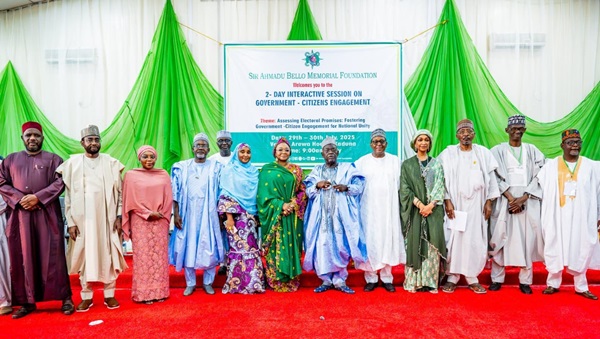
The director-general of the National Information Technology Development Agency (NITDA), Mallam Kashifu Abdullahi has reaffirmed the Federal Government’s commitment to leveraging digital technology to empower citizens, bridge social divides and foster national unity.
Abdullahi made this known during a two-day interactive session on government–citizen engagement organised by the Sir Ahmadu Bello Memorial Foundation at the historic Arewa House in Kaduna. The forum, themed “Assessing Electoral Promises: Fostering Government Engagement for National Unity,” brought together key stakeholders from government, civil society, academia and policy institutions to evaluate the delivery of President Bola Tinubu’s ‘Renewed Hope’ agenda.
Speaking at the event, Abdullahi stated that digital transformation is at the heart of Nigeria’s efforts to achieve the eight priority areas set by Tinubu, including economic reform, human capital development and improved service delivery. He emphasised that the digital economy is not merely a sector but a cross-cutting enabler that enhances productivity in areas such as agriculture, education, health and finance.
“Digital technology is not a vertical sector – it is pervasive and foundational. It powers everything else and provides a framework for inclusive growth,” he said.
Abdullahi outlined NITDA’s three-pronged strategic focus on human capital development, digital infrastructure expansion and innovation-driven entrepreneurship. He explained that these efforts are being realigned with the energy of the ‘Renewed Hope’ agenda, enabling government agencies and the private sector to work more collaboratively.
Highlighting the importance of human capital, he stressed that Nigeria’s greatest asset is its people. He noted that scaling up digital skills is key to unlocking national potential. Through initiatives such as the 3 Million Technical Talent (3MTT) programme and the Digital Literacy for All campaign, NITDA has trained over 350,000 individuals in northern Nigeria since 2023. The goal, he said, is to achieve at least 70 per cent digital literacy nationwide by 2027.
To support this, NITDA is partnering with the Federal Ministry of Education to integrate digital skills into the national curriculum from early childhood to tertiary level. Discussions with the National Universities Commission (NUC) are also underway to incorporate digital literacy into general studies courses across Nigerian universities. In addition, a collaboration with the National Youth Service Corps (NYSC) is equipping corps members to serve as digital literacy ambassadors in rural and underserved communities.
In terms of infrastructure, Abdullahi revealed that the Federal Government has approved the rollout of 90,000 kilometres of fibre optic cables to boost broadband access. Three digital centres are being constructed in each state, while Northern Nigeria – due to its unique development needs – is set to benefit significantly. So far, NITDA has established 13 IT community centres, 101 digital economy e-learning centres and one cybersecurity research centre in the region.
Abdullahi also pointed to renewed investor confidence, driven by Tinubu’s reform agenda. He disclosed that major global technology companies, including Google and Microsoft, are increasing their footprint in Nigeria. As part of the country’s growing visibility on the global digital stage, Nigeria will host two international events: GITEX Nigeria in September and the United Nations’ ICT for Governance (ICEGOV) Summit in November.
These gatherings, he noted, are expected to attract top-tier innovators and investors, further positioning Nigeria as a hub for digital innovation and inclusive development.


